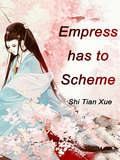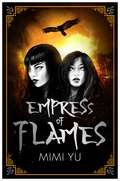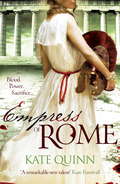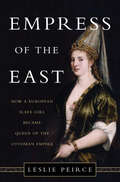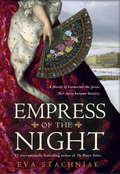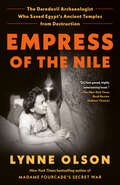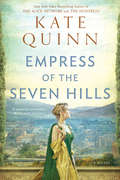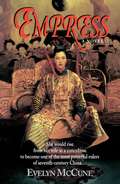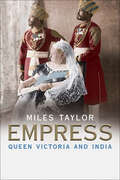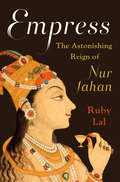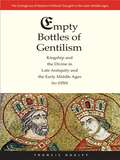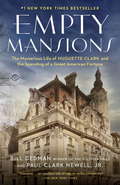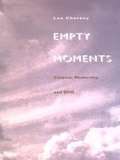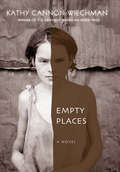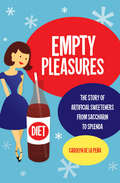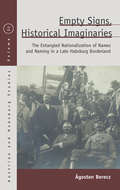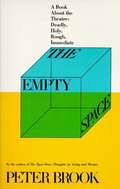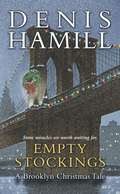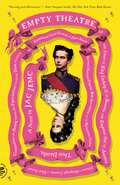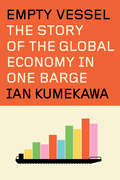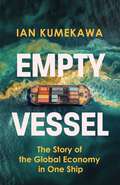- Table View
- List View
Empress has to Scheme: Volume 5 (Volume 5 #5)
by Shi TianxueIn the 21st century, because Lin Nan was betrayed by her boyfriend and transported to the Tian Ji Country, she became the daughter of the prime minister. She didn't want to fight, but she had drawn killing intent everywhere … He was the crown prince of the Eastern Palace, the only person who couldn't forget about him despite his heartless nature. He, the unparalleled musician, was unfathomable. Only the melancholy and despair of his back made him feel as if he had met a scum from his past life. Was it an unforgettable relationship, or was it a forsake that was too old for him? Where would she go from here? Where would he return to?
Empress of Flames
by Mimi YuIn this epic conclusion to The Girl King, two sisters war for a crown that was never meant to be theirs - though only one can wear it. As the late-Emperor's first-born, Princess Lu knows the throne rightfully belongs to her. She also can't forget her promise to shapeshifter Nok, the boy she loves, to win justice for his now powerless people. Yet even with an army at her side, Lu must face a major obstacle: the current Empress, her younger sister, Min.Princess Min used to live in Lu's shadow. Now she wields an ancient magic, one she's determined to use to forge her own path for the Empire, even if that means making enemies in court. But first, she must learn to control her power - before it consumes her . . . and the entire realm. Lu and Min are set for an epic confrontation, but the Empire faces a threat even greater than their rivalry. One that could cost them both the throne - and their lives.Praise for The Girl King:'Everything I want in a high fantasy' Samantha Shannon, Sunday Times bestselling author 'Mimi Yu has that gift of magic' Marjorie Liu, New York Times bestselling author'If you're down with dangerous magic, clans of shapeshifters, and worthy girls who somehow STILL need to prove their worth, then you will love this as much as I did' Kendare Blake, New York Times bestselling author
Empress of Flames (The\girl King Ser.)
by Mimi YuIn this epic conclusion to The Girl King, two sisters war for a crown that was never meant to be theirs - though only one can wear it. As the late-Emperor's first-born, Princess Lu knows the throne rightfully belongs to her. She also can't forget her promise to shapeshifter Nok, the boy she loves, to win justice for his now powerless people. Yet even with an army at her side, Lu must face a major obstacle: the current Empress, her younger sister, Min.Princess Min used to live in Lu's shadow. Now she wields an ancient magic, one she's determined to use to forge her own path for the Empire, even if that means making enemies in court. But first, she must learn to control her power - before it consumes her . . . and the entire realm. Lu and Min are set for an epic confrontation, but the Empire faces a threat even greater than their rivalry. One that could cost them both the throne - and their lives.Praise for The Girl King:'Everything I want in a high fantasy' Samantha Shannon, Sunday Times bestselling author 'Mimi Yu has that gift of magic' Marjorie Liu, New York Times bestselling author'If you're down with dangerous magic, clans of shapeshifters, and worthy girls who somehow STILL need to prove their worth, then you will love this as much as I did' Kendare Blake, New York Times bestselling author
Empress of Rome
by Kate Quinn'Fans of Philippa Gregory will be entranced. Kate Quinn's unforgettable third novel is a mesmerising story of passion, ambition and betrayal.' ELLEUnder its beloved Emperor Trajan, the Roman Eagle spreads its wings, advancing ever further into the untamed world. But neither Trajan nor his reign can last for ever. Gladiator turned soldier Vix is back in Rome to make his fortune. Sabina, the wayward daughter of a senator, craves adventure. United by their devotion to the Emperor, Vix and Sabina are unaware that the wolves are gathering. Trajan's enigmatic Empress has her own plans for Sabina. And the aristocratic Hadrian, the Empress's protégé, conceals dark ambitions rooted in a secret prophecy. When Trajan falls, the hardened warrior, the adventurous girl, the shadowy empress and the scheming politician are caught in a deadly whirlwind that threatens to seal all their fates - and that of the Roman Empire itself...From New York Times and USA Today bestselling author of THE ALICE NETWORK and THE HUNTRESS comes a powerful Roman epic, perfect for those who loved the HBO mini-series ROME.Readers LOVE Kate Quinn:'One of my absolute all-time favourite books ever!! Read it four times now and I still can't get enough of it.' ***** Reader Review'I would recommend it to anyone.' ***** Reader Review'One of my favourites!!! I highly recommend to anyone who enjoys Roman history.' ***** Reader Review'Wow! What a book! This is the best book I have read for a really long time. I couldn't put it down. WOW WOW WOW!!' ***** Reader Review'A spellbinding novel that gripped me from the start and I really can't wait to read the sequel.' ***** Reader Review'I love reading novels set in Roman times and this was certainly one of the best I have read in a very long time.' ***** Reader Review
Empress of Rome: The Life of Livia
by Matthew DennisonEmpress of Rome is the fascinating biography of one of the most perplexing and powerful figures of the ancient world: the empress Livia. Second wife of the emperor Augustus and the mother of his successor Tiberius, Livia has been vilified by posterity (most notably by Tacitus and Robert Graves) as the quintessence of the scheming Roman matriarch, poisoning her relatives one by one to smooth her son's path to the imperial throne. In this elegant and rigorously researched biography, Matthew Dennison rescues the historical Livia from this crudely drawn caricature of the popular imagination. He depicts a complex, courageous and richly gifted woman whose true crime was not was not murder but the exercise of power, and who, in a male-dominated society, had the energy to create for herself both a prominent public profile and a significant sphere of political influence.
Empress of the East: How a European Slave Girl Became Queen of the Ottoman Empire
by Leslie PeirceThe extraordinary story of the Russian slave girl Roxelana, who rose from concubine to become the only queen of the Ottoman empireIn Empress of the East, historian Leslie Peirce tells the remarkable story of a Christian slave girl, Roxelana, who was abducted by slave traders from her Ruthenian homeland and brought to the harem of Sultan Suleyman the Magnificent in Istanbul. Suleyman became besotted with her and foreswore all other concubines. Then, in an unprecedented step, he freed her and married her. The bold and canny Roxelana soon became a shrewd diplomat and philanthropist, who helped Suleyman keep pace with a changing world in which women, from Isabella of Hungary to Catherine de Medici, increasingly held the reins of power.Until now Roxelana has been seen as a seductress who brought ruin to the empire, but in Empress of the East, Peirce reveals the true history of an elusive figure who transformed the Ottoman harem into an institution of imperial rule.
Empress of the Night
by Eva StachniakThe follow-up to the #1 bestseller The Winter Palace--perfect for the readers of Hilary Mantel and Alison Weir. Catherine the Great, the Romanov monarch reflects on her astonishing ascension to the throne, her leadership over the world's greatest power, and the lives sacrificed to make her the most feared woman in the world--lives including her own... Catherine the Great muses on her life, her relentless battle between love and power, the country she brought into the glorious new century, and the bodies left in her wake. By the end of her life, she had accomplished more than virtually any other woman in history. She built and grew the Romanov empire, amassed a vast fortune of art and land, and controlled an unruly and conniving court. Now, in a voice both indelible and intimate, she reflects on the decisions that gained her the world and brought her enemies to their knees. And before her last breath, shadowed by the bloody French Revolution, she sets up the end game for her last political maneuver, ensuring her successor and the greater glory of Russia.
Empress of the Nile: The Daredevil Archaeologist Who Saved Egypt's Ancient Temples from Destruction
by Lynne OlsonThe remarkable story of the intrepid French archaeologist who led the international effort to save ancient Egyptian temples from the floodwaters of the Aswan Dam, by the New York Times bestselling author of Madame Fourcade&’s Secret WarIn the 1960s, the world&’s attention was focused on a nail-biting race against time: Fifty countries contributed nearly a billion dollars to save a dozen ancient Egyptian temples, built during the height of the pharaohs&’ rule, from drowning in the floodwaters of the massive new Aswan High Dam. But the extensive press coverage at the time overlooked the gutsy French archaeologist who made it all happen. Without the intervention of Christiane Desroches-Noblecourt, the temples would now be at the bottom of a vast reservoir. It was an unimaginably large and complex project that required the fragile sandstone temples to be dismantled, stone by stone, and rebuilt on higher ground.A willful real-life version of Indiana Jones, Desroches-Noblecourt refused to be cowed by anyone or anything. During World War II she joined the French Resistance and was held by the Nazis; in her fight to save the temples she challenged two of the postwar world&’s most daunting leaders, Egypt&’s President Nasser and France&’s President de Gaulle. As she told a reporter, &“You don&’t get anywhere without a fight, you know.&”Yet Desroches-Noblecourt was not the only woman who played an essential role in the historic endeavor. The other was Jacqueline Kennedy, who persuaded her husband to call on Congress to help fund the rescue effort. After years of Western plunder of Egypt&’s ancient monuments, Desroches-Noblecourt did the opposite. She helped preserve a crucial part of Egypt&’s cultural heritage, and made sure it remained in its homeland.
Empress of the Seven Hills (Empress of Rome #3)
by Kate QuinnFrom the national bestselling author of Daughters of Rome and Mistress of Rome comes a tale of love, power, and intrigue spanning the wilds of the Empire to the seven hills of Rome. Powerful, prosperous, and expanding ever farther into the untamed world, the Roman Empire has reached its zenith under the rule of the beloved Emperor Trajan. But neither Trajan nor his reign can last forever...Brash and headstrong, Vix is a celebrated ex-gladiator returned to Rome to make his fortune. The sinuous, elusive Sabina is a senator's daughter who craves adventure. Sometimes lovers, sometimes enemies, Vix and Sabina are united by their devotion to Trajan. But others are already maneuvering in the shadows. Trajan's ambitious Empress has her own plans for Sabina. And the aristocratic Hadrian-the Empress's ruthless protégé and Vix's mortal enemy-has ambitions he confesses to no one, ambitions rooted in a secret prophecy.When Trajan falls, the hardened soldier, the enigmatic empress, the adventurous girl, and the scheming politician will all be caught in a deadly whirlwind of desire and death that may seal their fates, and that of the entire Roman Empire...
Empress: A Novel
by Evelyn Mccune"McCune has recreated the splendor and intrigue of the imperial court in the Tang dynasty...giving us entertaining and informative access to a brilliant time and a complex woman."JEFFREY RIEGELChair, Department of East Asian LanguagesUniversity of California, BerkeleySweeping through exotic, turbulent seventh-century China, EMPRESS is the captivating epic of one extraordinary woman who would become the only female emperor in all of China's history. The story of Wu Jao, set against the backdrop of medieval China, reveals not only an age of horrifying barbarism, daring treachery, and precarious power, but also an eternal culture of sophistication and enlightenment.From the Trade Paperback edition.
Empress: Queen Victoria and India
by Miles TaylorAn entirely original account of Victoria’s relationship with the Raj, which shows how India was central to the Victorian monarchy from as early as 1837 In this engaging and controversial book, Miles Taylor shows how both Victoria and Albert were spellbound by India, and argues that the Queen was humanely, intelligently, and passionately involved with the country throughout her reign and not just in the last decades. Taylor also reveals the way in which Victoria’s influence as empress contributed significantly to India’s modernization, both political and economic. This is, in a number of respects, a fresh account of imperial rule in India, suggesting that it was one of Victoria’s successes.
Empress: The Astonishing Reign Of Nur Jahan
by Ruby LalFour centuries ago, a Muslim woman ruled an empire. When it came to hunting, she was a master shot. As a dress designer, few could compare. An ingenious architect, she innovated the use of marble in her parents’ mausoleum on the banks of the Yamuna River that inspired her stepson’s Taj Mahal. And she was both celebrated and reviled for her political acumen and diplomatic skill, which rivaled those of her female counterparts in Europe and beyond. In 1611, thirty-four-year-old Nur Jahan, daughter of a Persian noble and widow of a subversive official, became the twentieth and most cherished wife of the Emperor Jahangir. While other wives were secluded behind walls, Nur ruled the vast Mughal Empire alongside her husband, and governed in his stead as his health failed and his attentions wandered from matters of state. An astute politician and devoted partner, Nur led troops into battle to free Jahangir when he was imprisoned by one of his own officers. She signed and issued imperial orders, and coins of the realm bore her name. Acclaimed historian Ruby Lal uncovers the rich life and world of Nur Jahan, rescuing this dazzling figure from patriarchal and Orientalist clichés of romance and intrigue, and giving new insight into the lives of women and girls in the Mughal Empire, even where scholars claim there are no sources. Nur’s confident assertion of authority and talent is revelatory. In Empress, she finally receives her due in a deeply researched and evocative biography that awakens us to a fascinating history.
Empresses of Seventh Avenue: World War II, New York City, and the Birth of American Fashion
by Nancy MacDonellA NEW YORK TIMES MOST ANTICIPATED • In the tradition of The Barbizon and The Girls of Atomic City, fashion historian and journalist Nancy MacDonell chronicles the untold story of how the Nazi invasion of France gave rise to the American fashion industry.Calvin Klein. Ralph Lauren. Donna Karan. Halston. Marc Jacobs. Tom Ford. Michael Kors. Tory Burch. Today, American designers are some of the biggest names in fashion, yet before World War II, they almost always worked anonymously. The industry, then centered on Seventh Avenue in Manhattan, had always looked overseas for "inspiration"—a polite phrase for what was often blatant copying—because style, as all the world knew, came from Paris.But when the Nazis invaded France in 1940, the capital of fashion was cut off from the rest of the world. The story of the chaos and tragedy that followed has been told many times—but how it directly affected American fashion is largely unknown.Defying the naysayers, New York-based designers, retailers, editors, and photographers met the moment, turning out clothes that were perfectly suited to the American way of life: sophisticated, modern, comfortable, and affordable. By the end of the war, "the American Look" had been firmly established as a fresh, easy elegance that combined function with style. But none of it would have happened without the influence and ingenuity of a small group of women who have largely been lost to history.Empresses of Seventh Avenue will tell the story of how these extraordinary women put American fashion on the world stage and created the template for modern style—and how the nearly $500 billion American fashion industry, the largest in the world, could not have accrued its power and wealth without their farsightedness and determination.
Empty Bottles of Gentilism
by Francis OakleyIn this book--the first volume in his groundbreaking trilogy on the emergence of western political thought--Francis Oakley explores the roots of secular political thinking by examining the political ideology and institutions of Hellenistic and late Roman antiquity and of the early European middle ages. By challenging the popular belief that the ancient Greek and Roman worlds provided the origins of our inherently secular politics, Oakley revises our understanding of the history of political theory in a fundamental and far-reaching manner that will reverberate for decades. This book lays the foundations for Oakley's next two volumes, which will develop his argument that it is in the Latin middle ages that we must seek the ideological roots of modern political secularism.
Empty Mansions
by Paul Clark Newell Bill DedmanWhen Pulitzer Prize-winning journalist Bill Dedman noticed in 2009 a grand home for sale, unoccupied for nearly sixty years, he stumbled through a surprising portal into American history. Empty Mansions is a rich mystery of wealth and loss, connecting the Gilded Age opulence of the nineteenth century with a twenty-first-century battle over a $300 million inheritance. At its heart is a reclusive heiress named Huguette Clark, a woman so secretive that, at the time of her death at age 104, no new photograph of her had been seen in decades. Though she owned palatial homes in California, New York, and Connecticut, why had she lived for twenty years in a simple hospital room, despite being in excellent health? Why were her valuables being sold off? Was she in control of her fortune, or controlled by those managing her money? Dedman has collaborated with Huguette Clark's cousin, Paul Clark Newell, Jr., one of the few relatives to have frequent conversations with her. Dedman and Newell tell a fairy tale in reverse: the bright, talented daughter, born into a family of extreme wealth and privilege, who secrets herself away from the outside world. Huguette was the daughter of self-made copper industrialist W. A. Clark, nearly as rich as Rockefeller in his day, a controversial senator, railroad builder, and founder of Las Vegas. She grew up in the largest house in New York City, a remarkable dwelling with 121 rooms for a family of four. She owned paintings by Degas and Renoir, a world-renowned Stradivarius violin, a vast collection of antique dolls. But wanting more than treasures, she devoted her wealth to buying gifts for friends and strangers alike, to quietly pursuing her own work as an artist, and to guarding the privacy she valued above all else. The Clark family story spans nearly all of American history in three generations, from a log cabin in Pennsylvania to mining camps in the Montana gold rush, from backdoor politics in Washington to a distress call from an elegant Fifth Avenue apartment. The same Huguette who was touched by the terror attacks of 9/11 held a ticket nine decades earlier for a first-class stateroom on the second voyage of the Titanic. Empty Mansions reveals a complex portrait of the mysterious Huguette and her intimate circle. We meet her extravagant father, her publicity-shy mother, her star-crossed sister, her French boyfriend, her nurse who received more than $30 million in gifts, and the relatives fighting to inherit Huguette's copper fortune. Richly illustrated with more than seventy photographs, Empty Mansions is an enthralling story of an eccentric of the highest order, a last jewel of the Gilded Age who lived life on her own terms.Praise for Empty Mansions "An exhaustively researched, well-written account . . . a blood-boiling expose [that] will make you angry and will make you sad."--The Seattle Times "An evocative and rollicking read, part social history, part hothouse mystery, part grand guignol."--The Daily Beast "A childlike, self-exiled eccentric, [Huguette Clark] is the sort of of subject susceptible to a biography of broad strokes, which makes Empty Mansions, the first full-length account of her life, impressive for its delicacy and depth."--Town & Country "A spellbinding mystery."--BooklistFrom the Hardcover edition.
Empty Moments: Cinema, Modernity, and Drift
by Leo CharneyIn Empty Moments, Leo Charney describes the defining quality of modernity as "drift"--the experience of being unable to locate a stable sense of the present. Through an exploration of artistic, philosophical, and scientific interrogations of the experience of time, Charney presents cinema as the emblem of modern culture's preoccupation with the reproduction of the present. Empty Moments creates a catalytic dialogue among those who, at the time of the invention of film, attempted to define the experience of the fleeting present. Interspersing philosophical discussions with stylistically innovative prose, Charney mingles Proust's conception of time/memory with Cubism's attempt to interpret time through perspective and Surrealism's exploration of subliminal representations of the present. Other topics include Husserl's insistence that the present can only be fantasy or fabrication and the focus on impossibility, imperfection, and loss in Kelvin's laws of thermodynamics. Ultimately, Charney's work hints at parallels among such examples, the advent and popularity of cinema, and early film theory. A book with a structural modernity of its own, Empty Moments will appeal to those interested in cinema and its history, as well as to other historians, philosophers, literary, and cultural scholars of modernity.
Empty Places
by Kathy Cannon WiechmanIt is 1932, in Harlan County, Kentucky. Times are tough in the mining community, especially for thirteen-year-old Adabel Cutler's family. As they fight to survive, Adabel has to figure out her own identity while dealing with her volatile father, her dutiful sister, her defiant brother, and her mother's disappearance, which she can't seem to remember. This is a beautifully written and deeply felt coming-of-age novel by the acclaimed author of Like a River. Includes an author's note, bibliography, and archival images.
Empty Pleasures: The Story of Artificial Sweeteners from Saccharin to Splenda
by Carolyn De La PeñaSugar substitutes have been a part of American life since saccharin was introduced at the 1893 World's Fair. In Empty Pleasures, the first history of artificial sweeteners in the United States, Carolyn de la PeÑa blends popular culture with business and women's history, examining the invention, production, marketing, regulation, and consumption of sugar substitutes such as saccharin, Sucaryl, NutraSweet, and Splenda. She describes how saccharin, an accidental laboratory by-product, was transformed from a perceived adulterant into a healthy ingredient. As food producers and pharmaceutical companies worked together to create diet products, savvy women's magazine writers and editors promoted artificially sweetened foods as ideal, modern weight-loss aids, and early diet-plan entrepreneurs built menus and fortunes around pleasurable dieting made possible by artificial sweeteners. NutraSweet, Splenda, and their predecessors have enjoyed enormous success by promising that Americans, especially women, can "have their cake and eat it too," but Empty Pleasures argues that these "sweet cheats" have fostered troubling and unsustainable eating habits and that the promises of artificial sweeteners are ultimately too good to be true.
Empty Signs, Historical Imaginaries: The Entangled Nationalization of Names and Naming in a Late Habsburg Borderland (Austrian and Habsburg Studies #27)
by Ágoston BereczSet in a multiethnic region of the nineteenth-century Habsburg Empire, this thoroughly interdisciplinary study maps out how the competing Romanian, Hungarian and German nationalization projects dealt with proper names. With particular attention to their function as symbols of national histories, Berecz makes a case for names as ideal guides for understanding historical imaginaries and how they operate socially. In tracing the changing fortunes of nationalization movements and the ways in which their efforts were received by mass constituencies, he provides an innovative and compelling account of the historical utilization, manipulation, and contestation of names.
Empty Space
by Peter BrookFrom director and cofounder of the Royal Shakespeare Company Peter Brook, The Empty Space is a timeless analysis of theatre from the most influential stage director of the twentieth century. As relevant as when it was first published in 1968, groundbreaking director and cofounder of the Royal Shakespeare Company Peter Brook draws on a life in love with the stage to explore the issues facing a theatrical performance—of any scale. He describes important developments in theatre from the last century, as well as smaller scale events, from productions by Stanislavsky to the rise of Method Acting, from Brecht’s revolutionary alienation technique to the free form happenings of the 1960s, and from the different styles of such great Shakespearean actors as John Gielgud and Paul Scofield to a joyous impromptu performance in the burnt-out shell of the Hamburg Opera just after the war. Passionate, unconventional, and fascinating, this book shows how theatre defies rules, builds and shatters illusions, and creates lasting memories for its audiences.
Empty Stockings: A Brooklyn Christmas Tale
by Denis HamillChristmas 1963. A nation mourns the loss of its president. A young boy mourns the life his Irish-Catholic,working-class father never had. Rory Maguire is a fourteen-year-old boy looking for a better life for himself and his family in Brooklyn, New York. His father, Harry, had a terrible accident that cost him his job, his ability to walk, and his dignity. His brother, Dermot, is hanging out with a local gang called the Shamrocks, and his two little sisters are growing hungry in the Maguires' frigid tenement apartment. Rory's dreams of becoming a writer seem hopelessly out of reach, as does winning the heart of Carol, the daughter of a prominent Brooklyn lawyer. What Rory needs most this Christmas is a miracle -- and even though he can't bring his hero John F. Kennedy back to life, he might be able to give his father, an ex-merchant marine, the recognition he deserves. . . and offer his family the gift of hope, health, and happiness for years to come. In Empty Stockings, Denis Hamill captures the romance, strife, and spirit of the urban Irish-American experience. A heartwarming tale for all seasons, it is a gift to treasure and behold.
Empty Theatre: or The Lives of King Ludwig II of Bavaria and Empress Sisi of Austria (Queen of Hungary), Cousins, in Their Pursuit of Connection and Beauty...
by Jac JemcA wildly over-the-top social satire reimagining the mad misadventures of the iconic royal cousins King Ludwig and Empress Sisi, from the incomparable Jac Jemc.History knows them as King Ludwig II of Bavaria and Empress Elizabeth of Austria, icons of the late nineteenth century who died young and left behind magnificent portraits and palaces. But to each other they were Ludwig and Sisi, cousins who shared a passion for beauty and a stubborn refusal to submit to the roles imposed upon them.Ludwig, simultaneously spoiled and punished for his softness and “unmanly” interests, falls hard for the operas of Richard Wagner and neglects his state duties in the pursuit of art. Sisi, married at the age of sixteen to her beloved Franzl, bristles at the restrictions of her elevated position, the value placed on her beauty, and the simultaneous expectation that she ravage her body again and again in childbirth. Both absurdly vain, both traumatized by the demands of their roles, Sisi and Ludwig struggle against the ideals they are expected to embody, and resist through extravagance, petulance, performance, and frivolity.A tragicomic tour de force, Empty Theatre immerses readers in Ludwig and Sisi’s rarefied, ridiculous, restrictive world—where the aesthetics of excess belie the isolation of its inhabitants. With wit, pathos, and imagination, Jac Jemc takes us on an unforgettable journey through two extraordinary parallel lives and the complex, tenuous friendship that links them.
Empty Vessel: The Story of the Global Economy in One Barge
by Ian KumekawaThe rise of globalization and financialization as seen from a barge—one Swedish barge, to be exact, built in 1979 "The many-headed hydra of neoliberalism has found its chronicler." —Sven Beckert, author of Empire of Cotton"I&’ve rarely read a book that so deftly entwines a single, accessible story with the broad forces of globalization. A stunningly original history." —Maya Jasanoff, author of The Dawn WatchWhat do a barracks for British troops in the Falklands War, a floating jail off the Bronx, and temporary housing for VW factory workers in Germany have in common? The Balder Scapa: a single barge that served all three roles. Though the name would eventually change to Finnboda 12. And then to Safe Esperia. And later on, to the Bibby Resolution. And after that . . . in short, a vessel with so many names, and so many fates, that to keep it in our sights—as the protagonist of this fascinating economic parable—Ian Kumekawa has no choice but to call it, simply, the Vessel. Despite its sturdy steel structure, weighing 9,500 deadweight tons, the Vessel is a figure as elusive and abstract as the offshore market it comes to embody: a world of island tax havens, exploited labor forces, free banking zones, Thatcherism, Reaganomics, and mass incarceration, where even the prisoners are held offshore. Fitted with modular shipping containers, themselves the product of standardized global trade, the ship could become whatever the market demanded. Whether caught in an international dispute involving Hong Kong, Nigeria, Indonesia, and the Virgin Islands—to be settled in an English court of law—or flying yet another foreign &“flag of convenience&” to mask its ownership—the barge is ever a container for forces much larger than even its hulking self. Empty Vessel is a jaw-dropping microhistory that speaks volumes about the global economy as a whole. In following the Vessel—and its Sister Vessel, built alongside it in Stockholm—from one thankless task to the next, Kumekawa connects the dots of a neoliberal world order in the making, where regulation is for suckers and &“Made in USA&” feels almost quaint.
Empty Vessel: The Story of the Global Economy in One Ship
by Ian Kumekawa'Thrilling, meticulous and wondrously original' PHILIPPE SANDSA jaw-dropping microhistory of the global economy over the last fifty years told through the many lives of a single ship.At 94 meters long and 9,500 deadweight tonnes, once called the Bibby Resolution, is an unremarkable hulk, crossing the oceans unnoticed. And yet, the astonishing journey of this boat can tell us the story of the modern world.First built as a Swedish offshore oil rig in the 1970s, it went on to become a barracks for British soldiers in the Falklands War in the 1980s, a jail off New York in the 1990s, a prison in Portland in the 2000s, and accommodation for Nigerian oil workers off the coast of Africa in the 2010s. It has been called Safe Esperia, HMP The Weare, even 'The Love Boat'. In each of its lives this empty vessel has been commanded by economic forces much larger than itself: private investment, war, mass incarceration, imperial interests, national sovereignty, inflation, booms, busts and greed.Through its encounters with a world of island tax havens, the English court system, exploited labour forces, free banking zones or immigration politics, the ordinary boat at the heart of this story reveals our complex modern economy to us, connecting the dots of a dramatically changing world in the making, and warning us of its dangerous consequences.
Empty Vessel: The Story of the Global Economy in One Ship
by Ian Kumekawa'Thrilling, meticulous and wondrously original' PHILIPPE SANDSA jaw-dropping microhistory of the global economy over the last fifty years told through the many lives of a single ship.At 94 meters long and 9,500 deadweight tonnes, once called the Bibby Resolution, is an unremarkable hulk, crossing the oceans unnoticed. And yet, the astonishing journey of this boat can tell us the story of the modern world.First built as a Swedish offshore oil rig in the 1970s, it went on to become a barracks for British soldiers in the Falklands War in the 1980s, a jail off New York in the 1990s, a prison in Portland in the 2000s, and accommodation for Nigerian oil workers off the coast of Africa in the 2010s. It has been called Safe Esperia, HMP The Weare, even 'The Love Boat'. In each of its lives this empty vessel has been commanded by economic forces much larger than itself: private investment, war, mass incarceration, imperial interests, national sovereignty, inflation, booms, busts and greed.Through its encounters with a world of island tax havens, the English court system, exploited labour forces, free banking zones or immigration politics, the ordinary boat at the heart of this story reveals our complex modern economy to us, connecting the dots of a dramatically changing world in the making, and warning us of its dangerous consequences.
